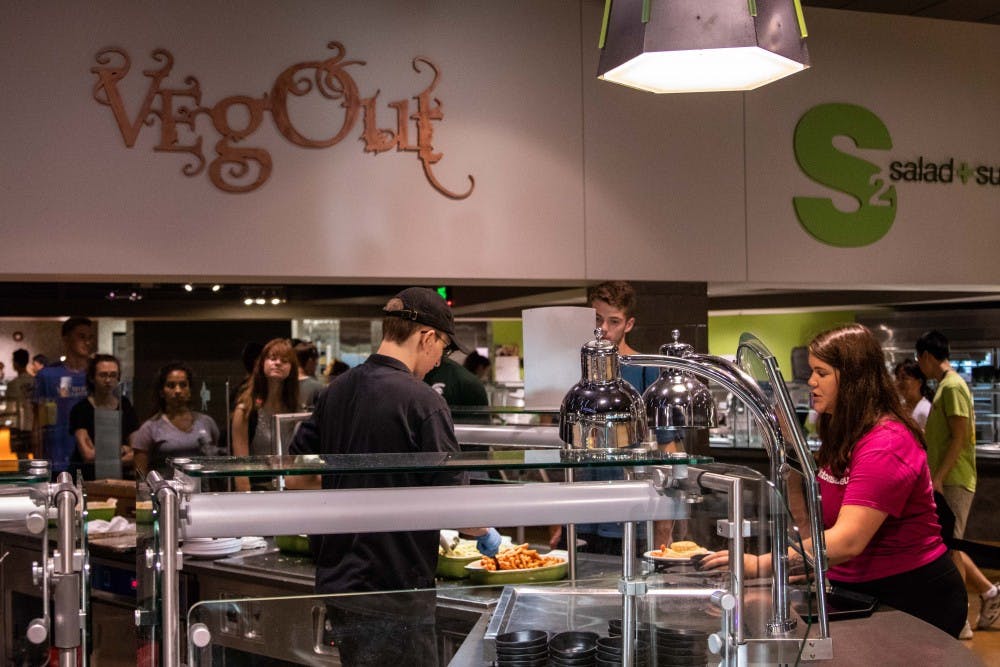MSU has said that "making healthy lifestyle choices like eating right helps students do their best" while they're at the university.
And, according to Eat at State, the culinary services division of MSU's Residential and Hospitality Services, or RHS, access to food at 10 cafeterias spread out over MSU's five neighborhoods helps students reach that goal. In total, there are more than 30 places on campus for all students to find food to fuel them throughout their day. Food courts, Sparty's and Starbucks supplement the gaps between classes or when students can’t get to a cafeteria.
But the experience of eating at MSU varies from student to student.
Eat at State says it offers options for multiple different types of diets, with each cafeteria offering options for vegetarian, vegan, dairy-free, gluten-free and kosher meals. Each station includes labels to identify major food allergens.
Though for some students with alternative diets, there's not enough variety in those meal options.
Vegetarian and MSU senior Gabriel Seck said she takes it upon herself to be aware of what she’s eating for her own health. That becomes a struggle when she's faced with mislabeling or cross-contamination.
“For me, the biggest problem within the realm of food is there is no list that's like 'if you go online you can see what we're serving today, and you can do a drop-down of what it's made with,'” Seck said. “A lot of times, the cafs will label something vegetarian but it’s not, especially in desserts.”
Dining hall stations that keep meat separate from vegetarian items are great, Seck said, but the potential for cross-contamination at other stations creates a problem.
“The Gallery, for example, does a good job when they have their pasta bar, they have their meat separate and that’s great. But for, say Shaw and their Wok, I can’t go in and get veggies unless it is veggie everything that day,” Seck said.
The cross-contamination can happen, according to Eat at State. A note on their website asks diners to "be aware that food items are prepared in a shared kitchen and do pose a risk for cross contact."
“They need better labeling, better containment, and they need more options for vegans,” Seck said. “Vegans and vegetarians are very, very different and vegans can only eat so many carrots and vegetables.”
Seck said MSU needs to consider dietary restrictions in order to be inclusive to all students.
“It’s hard because this is a lifestyle they do have to consider, people who are vegetarian for health reasons like me and many other people or for religious reasons, so if they want to be inclusive to everyone, changes need to happen,” Seck said.
But political theory and constitutional democracy senior Brendan Barbara said he’s had an easier time finding vegan food on campus than in some restaurants.
"Brody definitely has the best options because they have a Veg Out in the cafeteria and it’s the biggest on campus, I believe, so that was really nice for me because they would always have vegetarian options,” Barbara said. “But sometimes it wasn’t the greatest because they wouldn’t always have vegan options.”
Barbara said vegetarian and vegan meals were also regularly rotated in the cafeterias.
“They changed them up just as much as they did with meat options and I never went without food in a cafeteria,” Barbara said.
While living on campus, construction management student Atara Zwas’ eating choices are influenced by her religion. Zwas consumes a kosher diet because she is Jewish.
“There were options when I was eating there,” Zwas said. “They clearly labeled them, which was really nice so it was easier to find them. Certain days there were fewer options than others, so I would have to go about and hunt at all the different stations to piece together a decent meal.”
For students who practice Judaism, Eat at State offers kosher options at Wilson Dining Hall, Brody Square and at Sparty’s locations across campus. MSU Hillel also offers Shabbat, or Friday night dinners, as well as meals during the week of Passover.
Support student media!
Please consider donating to The State News and help fund the future of journalism.
"Pretty sure Brody has kosher food, but that was too far and I’m not that good of a Jew,” Zwas said.
Students who have allergies, specific ingredient concerns or require information on a menu can consult Gina Keilen, a registered dietician at MSU, or executive chefs and dining hall managers. There is also a website which lists all ingredients in each dish.
Editor's note: This article was updated at 4:25 p.m., Sept. 7, to include a website that lists all ingredients used in dishes.
Discussion
Share and discuss “Students with alternative diets talk pros and cons of campus dining” on social media.







